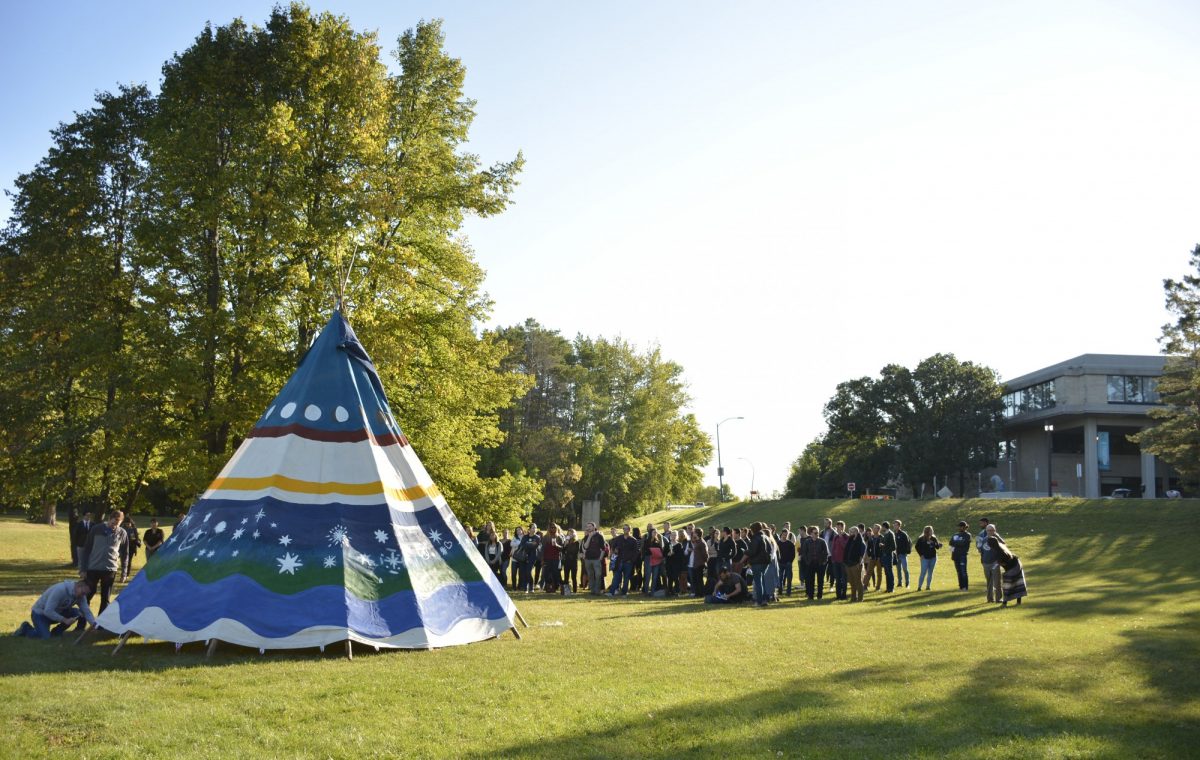
Faculty of Law co-hosts SSHRC-funded Indigenous E-Conference with Lakehead, UNB
Hybrid event explores ways to end police violence against Indigenous people in need of assistance
On July 7, 2022, Robson Hall’s Common Room will be the site of a SSHRC-funded in-person and online workshop focussed on identifying ways to end the phenomenon of police killing Indigenous people in need of assistance. Marc Kruse, Indigenous Legal Studies Coordinator for the Faculty of Law at the University of Manitoba, is organizing the Manitoba component of the workshop which brings the UM Faculty of Law together with Lakehead University’s Bora Laskin Faculty of Law, the University of New Brunswick’s Faculty of Law, and community-driven project, Looking Out for Each Other, run by the New Brunswick Aboriginal Peoples Council.
The Faculties of Law on all three university campuses will host their respective workshops at the same time and date, and will feature panels to be e-conferenced between the three sites, followed by local sharing circles. All participants will gather together for a final discussion.
“This workshop has been a long time in planning, and we hope that it will yield important and insightful solutions to the critical and persistent problem in this country, which is that Indigenous people are being harmed and killed by police when seeking medical/mental health assistance, rather than protected by them,” said Kruse. “Nothing can be more opposite or wrong than that, and we three faculties of law are very much looking forward to making this important collaborative event yield something to move us forward to solutions. We hope to be able to host further workshops to make policy recommendations to relevant government and police organizations.”
“Exploring the ways that institutions fail Indigenous persons and communities is a fundamental step in remediation and social change,” said Dr. Richard Jochelson, Dean of Law at the University of Manitoba. “That this discussion is happening across multiple universities and stakeholders, demonstrates the synchronicities needed to make critical improvements.”
“Sometimes questioning the assumptions and values of the institutions themselves is a condition precedent to transformation, and this conference both highlights points of advocacy contained in the Truth and Reconciliation Commission report and assists in forging a path forward.” – Dr. Richard Jochelson, Dean of Law, University of Manitoba
The workshop’s official title is “Killed for Our Own Good? Ending Police Violence Against Indigenous People in Need of Assistance.” The deaths of Chantel Moor, a member of the Tla-o-qui-aht First Nation, and Rodney Levi, a member of Metepenagiag Mi’kmaq Nation who were killed by police in New Brunswick in 2020, have drawn attention to the persistent problem of police violence against Indigenous people in Canada. The risk of needing police assistance is much higher for many Indigenous people than for the average person, and yet the risk of being harmed or killed by police is even higher. Unlike many Canadians, Indigenous individuals cannot simply call police for help without routinely engaging in complicated risks and delays.
A call for participation is still open for the Manitoba workshop. Organizers invite anyone of the following groups to email workshop_pv@gmail.com to participate:
- Community members or representatives from Indigenous communities or organizations wishing to provide direction and feedback to researchers;
- Government representatives;
- Academics, researchers, or students working in fields related to policing, law, social sciences, Indigenous studies or criminal justice;
- Lawyers or advocates with experience on matters related to police misconduct or accountability;
- Members or former members of a police oversight body;
- Crisis response, mental health service, or community service providers;
- Members, civilian employees, or representatives of police services, or members of a mobile crisis team;
- Individuals with lived experiences of police violence or misconduct.
The objectives of the collaborative workshops include:
- providing a culturally supportive and respectful environment for all participants in which to create a community of interest that can work together for positive change;
- identifying reform or abolition proposals that can be implemented legislatively or through policy with a view to making it safer for Indigenous people to access essential protective and assistive services;
- creating a plain language final report in consultation with Indigenous partners that will be shared with all participants.
Please register by submitting this form online.
Funding will be available to support Indigenous participants or student participants requiring financial assistance to attend.
Given the sensitive nature of the subject matters discussed, mental health and Indigenous cultural supports will be available for workshop participants, and follow-up by Indigenous counsellors will be provided for those experiencing distress.
Manitoba participants requiring accommodation or seeking information on accessibility can contact Marc Kruse at marc.kruse@umanitoba.ca.






